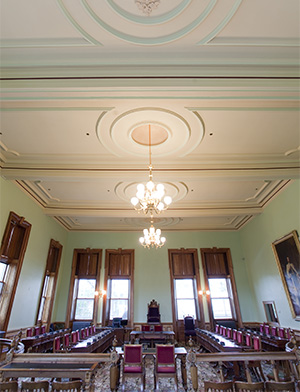Legislative Committees
Legislative committees have existed in New Brunswick since the meeting of the first Legislative Assembly in 1786. The main characteristic of any legislative committee is that it is appointed by the Legislative Assembly and consists entirely of Members of the Assembly. Legislative committees consider matters which are referred to them by the Legislative Assembly. They exist to expedite the work of the House and to allow for more thorough study of complex or technical questions. Committees can be of a more convenient size than the Assembly, allowing for a more detailed analysis of the matters referred to them than may be available in the House. Committees often take the place of the Legislature when it is necessary to consult the population, examine a Bill in detail, or carry out an in-depth study or investigation on a specific matter.
Legislative committees are appointed by the Assembly and exercise only those powers and authority vested in them by the House. Committees do not have independent powers of inquiry to examine matters of their own choosing, unless that power is specifically granted by the House. Within its terms of reference, however, each committee is afforded total independence in its deliberations. A committee can be authorized by the House to call for persons, papers and records which enables it to examine witnesses and obtain expert advice. Committees can also provide a means by which the public can provide input on a matter and make their views and opinions known to the Legislature.

Standing Committees
Standing committees are appointed at the commencement of each new Legislature and exist for the life of an Assembly. The Standing Rules provide for the appointment of nine standing committees. Standing committees are appointed to consider all matters of a particular class referred to them by the Assembly. From time to time, standing committees may also study a particular subject matter referred to them by the House.
The powers and functions of standing committees are either set out in the Standing Rules or established by precedent or order of the House. No limit is set by the Standing Rules on the size of these committees, and the size may vary from committee to committee. Standing committees meet throughout the year with authority to report from time to time on matters referred to them by the House.
-
Legislative Administration Committee
-
Standing Committee on Climate Change and Environmental Stewardship
-
Standing Committee on Economic Policy
-
Standing Committee on Estimates and Fiscal Policy
-
Standing Committee on Law Amendments
-
Standing Committee on Official Languages
-
Standing Committee on Private Bills
-
Standing Committee on Procedure, Privileges and Legislative Officers
-
Standing Committee on Public Accounts
-
Standing Committee on Social Policy
Select Committees
From time to time the House may appoint a Select Committee to consider and report on a particular subject or to undertake a specific task or inquiry. A Select Committee is created by means of a motion defining its membership and mandate.
Standing Rule 94 provides for the appointment of Select Committees: Select Committees may be appointed on motion and continue to exist until the presentation of their final reports or until the dissolution of the House whichever occurs first.
Select Committees often hold public hearings to obtain input on the subject matter being considered and frequently invite government officials or other expert witnesses to appear. Select committees have the same powers as Standing Committees, including the power to strike sub-committees and to hear witnesses. Select committees report directly to the Legislative Assembly.

